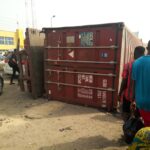
These facilities were part of the $195m deep blue projects aimed at enhancing the nation’s maritime security and capacity in line with the best global practices.
Speaking during the commissioning at Kirikiri, Lagos, the Minister of Transportation, Muazu Sambo, said the completed projects were part of the government’s commitment to good governance and institutionalised policies for improved maritime safety and security.
Other projects commissioned by the minister include five new patrol/security boats, five refurbished search and rescue/pollution control boats, four staff ferries, a search and rescue clinic and an administrative building.
Sambo also that the projects will boost the nation’s waters as well as ensure service delivery and economic development.
“These projects will enable the country to achieve and sustain safe and secure shipping, cleaner oceans and enhanced maritime capacity.”
The minister said the state-of-the-art enforcement platforms will ensure strict compliance and adherence with the extant laws governing the operations of the nation’s maritime domain.
He reiterated that the platforms will also give NIMASA the needed tools required to function as a maritime administrator in line with the protocols and conventions of the International Maritime Organisation (and International Labour Organisation to which NIMASA represents Nigeria as its contracting government.
“The search and rescue clinics will enable the agency to fulfil its obligations to seafarers and the general public by providing top-notch medical care facilities.”
Sambo said the newly acquired communication gadgets will enable the agency’s enforcement as well as search and rescue operators to communicate in real-time without any hindrance or interference while conducting their operations at sea.
Earlier, the Director General, NIMASA, Dr Bashir Jamoh, said the inclusion of the security/patrol boats along with the search and rescue/pollution control boats to the deep blue project assets are particularly with the intent to intensify the internal security on the waterways, taking into cognizance the recent proliferation of oil theft.
Jamoh said the agency also simultaneously took cognizance of the damaging impact that piracy, kidnapping of seafarers, smuggling, illegal oil bunkering, robbery at sea and illegal, unregulated, and unreported fishing had on the nation’s maritime profile.
“The successful reduction of piracy in the Gulf of Guinea can be credited to the tremendous effort of the Federal Government in terms of provision of infrastructures, through the deep blue project, investment towards vessels, maritime domain awareness platforms, as well as land, air and sea assets. Beyond the strides at overcoming maritime crime at the Gulf of Guinea, the management and safety of the nation’s inland waterways equally deserve attention.”
Jamoh added that NIMASA is committed to ensuring that waterways are safe for local transportation and other leisure activities so that more internal revenues are generated.
He further stated that it is important to keep the inland waterways free of waste and pollutants to ensure they remain navigable in addition to keeping them secured from perpetrators of maritime crime.
Also speaking, the Chairman, House Committee on Maritime Safety, Education & Administration, Lynda Ikpeazu, commended NIMASA management for their focus and commitment to seeing all the projects through.
Ikpeazu said the 9th Assembly is glad to be part of the achievement and success of the projects that will enhance shipping and security in the country.
She, however, charged the NIMASA management to ensure the judicious use of the assets, while lamenting that the problem in Nigeria is having wonderful ideas but lack maintenance culture.





